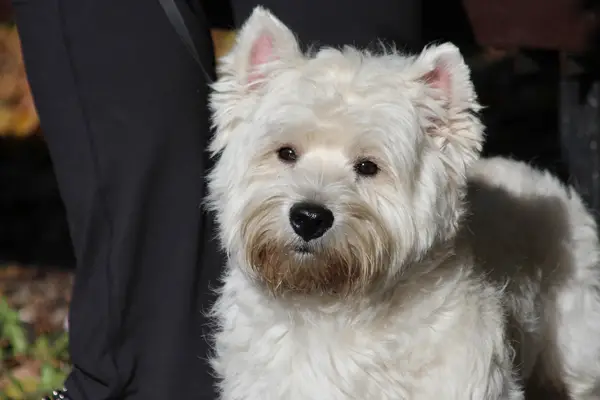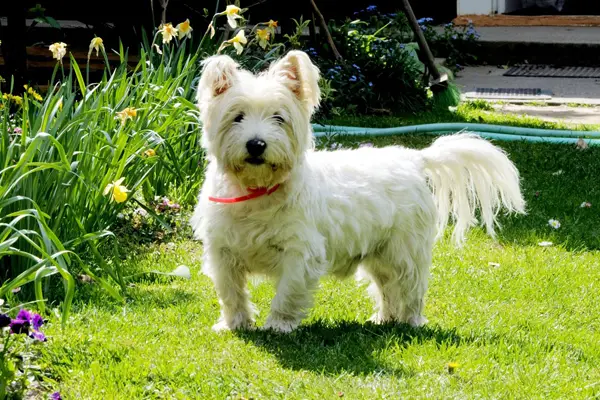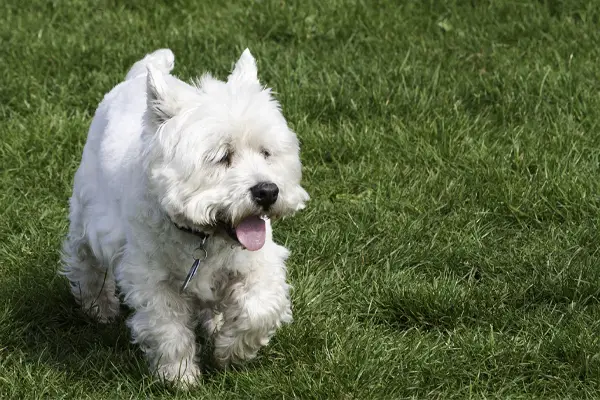The West Highland White Terrier is one of the few short-legged terriers that can grow up to 11 inches tall. They have a compact body that can surely move swiftly. The best feature of the West Highland White Terrier is its attractive and irresistible looks. The breed is covered with a harsh and silky white coat that makes them easily identifiable even if he’s a distance away.
This dog breed has a big personality. And though they may look like a toy dog, their personality is far from it. They are a true terrier dog breed – intelligent, strong, sturdy, and excellent hunters.

West Highland White Terrier Statistics
| Dog Breed Group | Terrier |
| Breed Size | Small |
| Height | 11 inches (male); 10 inches (female) |
| Weight | 15-20 pounds |
| Lifespan | 13-15 years |
West Highland White Terrier Ratings
| Energy level | |
| Exercise needs | |
| Requires attention | |
| Playfulness | |
| Trainability | |
| Shedding | |
| Grooming | |
| Friendly with family | |
| Friendly with kids | |
| Friendly with strangers | |
| Friendly with other dogs | |
| Prey Drive |
West Highland White Terrier History
The exact origin of the West Highland White Terrier is unknown. However, it’s believed that his history is in line with that of the Dandie Dinmont, Skye, Scottish, and Cairn Terriers, which are all branches of the same tree. And just like these dog breeds, it’s believed that West Highland White Terriers originated from Scotland.
West Highland White Terriers were originally used for hunting fox, badger, and otter. They were also ratters that helped get rid of rodents from houses of nobles and farmers.
It was in the 1700s when the Malcolm clan started breeding little white exterminators in their estate called Poltalloch. And for more than 100 years, they were produced and maintained there. This is why the breed was originally called Poltalloch Terrier.
It was only in 1896 when the breed was first introduced at a Scottish dog show and immediately rose to popularity. By that time, their name was changed to West Highland White Terrier.
By 1906, the breed was first shown in an American Kennel Club Show, and Americans immediately loved his spunky and amusing personality. The fact that he’s small and portable made him even more popular as a companion dog.

Temperament
The American Kennel Club describes the West Highland White Terrier as a loyal, happy, and entertaining dog breed. They are affectionate dogs who love human companionship. Plus, he can certainly make you laugh.
As a terrier dog, West Highland White Terriers are smart, independent, bold, and can be a little stubborn. They are also very sturdy because of their background as hunters. They have a sense of independence that makes them a little hard to train, so it’s best to be patient with them.
The good side is that they are friendlier than other terrier dog breeds. They are friendly and get along well with everyone – children, strangers, other dogs, other pets. This is not a one-person dog breed. Heck, they will even run towards a visitor with his tail wagging.
They’re a lively dog breed and would greatly appreciate even the smallest thing. He’ll be happy if you give him a toy, a belly rub, and food.
Like any other dogs, training and early socialization are crucial. It’s also vital that you show him who’s in charge without being harsh or aggressive.
Care Requirements
- Nutrition: Most West Highland White Terriers have sensitive stomachs. They are also prone to food allergies and diabetes, which is why it’s essential to feed them high-quality food in appropriate amounts. They are easy to overfeed just like any other small dogs, so make sure that you measure the daily calorie intake. This would, of course, depend on your dog’s weight and age. Active West Highland White Terriers require about 700 kilocalories of food in a day, while the inactive ones require about 450 kilocalories. It’s also crucial that the diet you feed them consists of a great balance between all essential nutrients – proteins, carbohydrates, fats, fiber, vitamins, and minerals. For proteins, you can derive this from high-quality meat such as fish, chicken, beef, or lamb. You can add brown rice for carbohydrates, and fruits and vegetables for fiber. For commercially dry food, stay away from products containing fillers and meat by-products. These are indigestible and can upset your Westie’s stomach. Make sure that you are also aware if there are ingredients he’s allergic to so you can stay away from those.
- Grooming: The West Highland White Terrier has a short coat that needs to be groomed regularly. It doesn’t shed much, but it requires daily brushing to remove tangles and prevent mats from forming. This will also keep it healthy and in good condition. The coat may also grow longer, so make sure to have it trimmed, especially in the areas around his eyes. If you’re not confident with your trimming skills, it’s best to take him to an expert groomer. They don’t require frequent bathing because of their hard coat. You can do this occasionally, or when they get too dirty. The ears should be checked and cleaned regularly even if you haven’t bathed him. Nails should be checked and trimmed regularly as well.
- Exercise: West Highland White Terriers enjoy play and long walks daily. They are a highly active dog breed, and regular exercise is crucial to keep them happy; at least 1 hour of exercise a day should be sufficient. If you have a fenced yard, it’s always a great idea to let him off-leash and run around. Always keep an eye on him to make sure that he doesn’t do anything unnecessary, such as digging through your yard. You can also create some activities that you can play together with, such as fetch or even training. West Highland White Terriers are also great at sporting events, and honing their skills would be a great daily activity.
- Health: West Highland White Terriers generally have a long lifespan; however, they too are susceptible to some diseases. Minor health problems they can suffer from are keratoconjunctivitis sicca, copper toxicosis, patellar luxation, and cataract. The major health problems you need to watch out for are Legg-Perthes disease, craniomandibular osteopathy, globoid cell leukodystrophy, and skin diseases. Some of these health issues can be detected at an early stage through some screening tests. So if you want to rule out some diseases, you can opt for that. You can also check the parents of the breed for illnesses that are genetically transferred. This way, you know the possibility of your Westie having that same disease.
- Lifespan: The life expectancy of West Highland White Terriers is 13-15 years.

Famous West Highland White Terriers
- Imelda: The West Highland White Terrier on the label of Australia’s My Dog dog food brand
- Happy: A Westie who played a part in the film 7th Heaven
- McDuff: The main character in a book series written by Rosemary Wells
- Cesar and Maggie: Mascot and Poster dogs for the Cesar dog food in the US (Cesar) and Canada (Maggie)
- Sarah: The West Highland White Terrier of Alfred Hitchcock, a movie director
Fun Facts About West Highland White Terriers
- West Highland White Terriers originated in Northwestern Scotland.
- They were originally bred as ratters.
- Their snow-white fur has a purpose – to make sure that they stay visible during hunting. This is also to prevent hunters from mistaking them into other animals.
- They were first named as Poltalloch Terriers and were registered as Roseneath Terriers.
- They have sensitive ears that get sunburned if they stay too long under the sun. So, make sure you put sunscreen on them.
- They love going in tight spaces and may end up getting stuck.
Check Out Other Terrier Dog Breeds:
Airedale Terrier, American Hairless Terrier, American Staffordshire Terrier, Australian Terrier, Bedlington Terrier, Border Terrier, Bull Terrier, Cairn Terrier, Cesky Terrier, Dandie Dinmont Terriers, Glen of Imaal Terriers, Irish Terrier, Kerry Blue Terrier, Lakeland Terrier, Manchester Terrier, Miniature Bull Terrier, Miniature Schnauzer, Norfolk Terrier, Norwich Terrier, Parson Russell Terrier, Rat Terrier, Russell Terrier, Scottish Terrier, Sealyham Terriers, Skye Terrier, Smooth Fox Terrier, Soft Coated Wheaten Terrier, Staffordshire Bull Terrier, Welsh Terrier, Wire Fox Terrier
